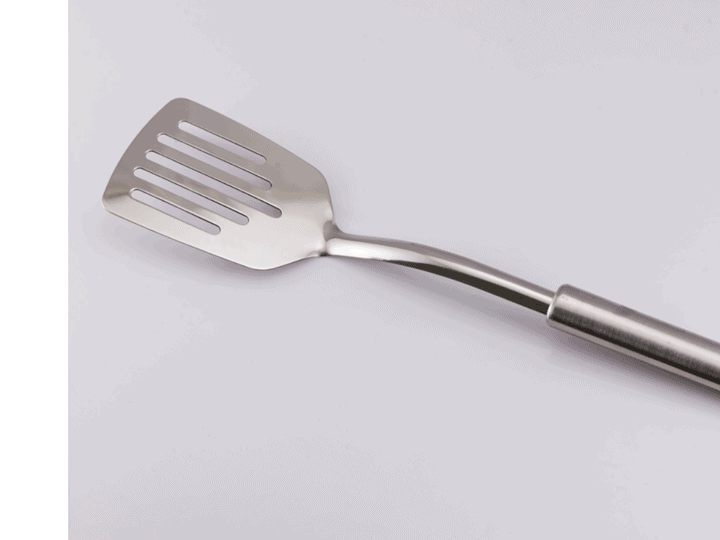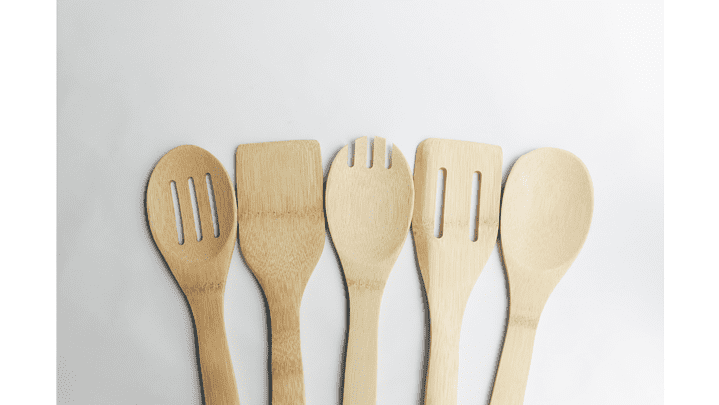A turner is a common, yet vital kitchen tool that is also called a flipper. A member of the spatula family, this handy device has been around in one form or another since Ancient Rome. Though it was refined specifically for kitchen use in the 1500s.
Turners are specifically used for food already being prepared in a pan, skillet, or grill. When browsing the kitchen gadget section of any retailer, there seems to be an endless number of these flat scoopers.
It can get confusing; square, rounded, metal, rubber, solid, or slotted. Why are there so many variations of one simple tool? Won’t a turner with slots do the same thing as one that’s solid? Read on to find out.
Related: The Top Spatulas for Making Smash Burgers
When To Use A Slotted Turner vs A Solid Turner?
For those that don’t know, the answer is pretty straightforward, but is guaranteed to up your game in the kitchen.
A slotted turner is for oily or more liquid based foods like taco meat, fish, omelets, and hash browns. The slots allow the liquid to drain off. The openings also reduce surface tension, making the food less likely to stick. Slots will allow air to get under to make for easier lifting as well.
A solid turner is best for heavier, bumpy foods that need to be moved, like hamburgers and cookies. They are also good for getting an even press when cooking burgers, sausage or other meat.
Here are the ideal uses for each type:
Slotted
- liquid/oil
- delicate items

Solid
- heavier
- transferring
- pressing

What Are The Characteristics of A Good Turner?
Not all turners are created equal. A spatula turner purchased in the dollar store probably will not be as good as the one you get from a home goods store. The material used and the quality is just different.
So do yourself a favor and invest in a good quality slotted and solid turner. Your food will thank you.
A good turner will come with:
- high quality materials that are heat resistant, like stainless steel, silicone, or bamboo
- a handle that is long enough to keep you away from the heat
- a handle design that doesn’t tire out your hand/wrist
- an easy to clean design
- holes to hang in a convenient place
Why Can’t I Use A Rounded Rubber Spatula To Turn My Food?
The simple answer is you’ll ruin the spatula and make a mess of the food. If you’re really in an egg-flipping bind, and don’t care what the egg looks like, then it’s OK. But you don’t want to make a habit of using a rubber spatula in a pan.
The spatula can melt, fray, curl, and stain. A rubber spatula is for folding in ingredients, mixing, spreading, smoothing, and scraping. This tool is not meant to flip anything or transfer items from pan to plate like a turner.
Which Materials Are The Best For Turners?
1. Stainless Steel
Stainless steel turners are great for a number of reasons. They are non-porous and hypoallergenic, so no microbes or water will creep in.
They’re easy to clean and diseased safe. Stainless turners are extremely difficult to destroy and can last indefinitely. This makes them worth the extra money you’ll spend compared to other materials.
The drawbacks are that stainless steel can scratch many pans and gets hot to the touch.

2. Silicone
Silicone is a combination of carbon, silicon, oxygen, and hydrogen. This material is soft and flexible, so most ingredients will not sick to it. Silicone is easy to clean and won’t scratch your pans.
You can throw it in the dishwasher and it stays cool to the touch. The main problem with this material is that it can stain (especially tomato sauce) and tends to hold odor.
3. Bamboo
Bamboo is not always the first material that comes to mind when we think about turners and other utensils. But it should be! Bamboo is a grassy plant that literally regrows over night. Certain varieties will grow 36 inches in just 24 hours. So we’re not harming or destroying ecosystems or habitats by using them.
Bamboo is antimicrobial, so bacteria won’t grow. Water also has a hard time getting in, so it won’t warp or crack as much as wooden utensils. It’s lightweight and doesn’t stain. This grass-rooted turner also will not get hit or scratch anything.
The only downside (which is barely one), is that it cannot be put in the dishwasher.
4. Wooden
Wooden turners are strong yet won’t scratch surfaces. They stay cool and most will resist bacteria. They can be difficult to clean and stain.
What Are Some Creative Uses For Turners?
They say, “creativity is the mother of invention.” The turner can be quite a handy tool if you need it to be. Just make sure to wash it thoroughly or buy a new one if it’s used for some of the following:
- as a child’s toy in the sandbox
- a drywall scraper
- getting to something that’s out of reach
- to scrape snow or ice off your windshield (not the stainless steel)
- to cut through dough
- to support a plant
- to clean a BBQ grill
Turner FAQ’s
1. What’s the difference between a slotted and a solid turner?
A slotted turner is best for watery or oily ingredients. A solid turner is best for heavier objects, and ones that need to be transferred to another area.
2. What are the best materials for a turner?
Stainless steel, silicone, and bamboo are the best for both slotted and solid turners.
3. Can you use a rubber spatula as a turner?
It is not recommended that you use a rubber spatula in place of a turner.
4. Which is better, a slotted turner or a solid turner?
The bottom line is, it’s what you’re more comfortable working with. It’s not a matter of better or worse, but what each turner is designed to do.







